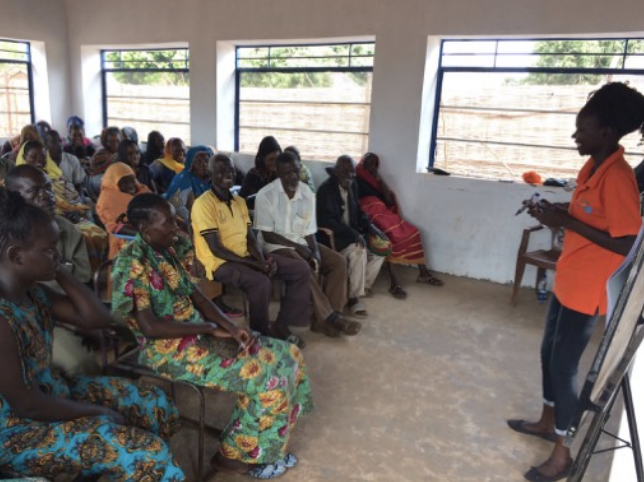Improving Access to Services for Persons With Disabilities in Lokoloko
Between 2016 and 2019, tens of thousands of people fleeing violence across Western Bahr el Gazal State, South Sudan have moved to Wau town and surrounding locations for safety. Of over 67,000 internally displaced persons (IDPs) in Wau town, more than 20,000 people have settled in Lokoloko, the South Sudan Relief and Rehabilitation Commission (RRC) in Wau State. In November 2019, the NP team in Wau was requested by the Protection Cluster to visit Lokoloko to assess the protection needs of persons with disabilities in the area.

From 7 to 20 November 2019, NP’s Wau Response Team interviewed over 160 men and women with disabilities, individually and in groups, and learned that persons with disabilities and their caretakers face a multitude of barriers to access food, water, shelter, education, health services, and income-generating activities. Furthermore, persons with disabilities are not well accepted by communities in Lokoloko and are frequently discriminated against, harassed, and abused.
Kasima, a 35-year-old woman NP spoke to, has been paralyzed since a very young age. When violence occurred in Raja in July 2018 an international NGO evacuated Kasima to Lokoloko, where she was reunited with her aunt. A wheelchair was the only aid Kasima has ever received. When Kasima moves in her wheelchair outside, young men throw stones at her. To make a living, Kasima’s aunt sells groundnuts and cooking paste, but the money she makes is not enough for her and her niece to survive. Falling to pay rent, Kasima and her aunt now have to vacate the house they are living in. Kasima has never seen a doctor and wonders if her paralysis may be reversible.
People with limited mobility, like Kasima, face restricted or no access to food registration and distribution points, boreholes, health facilities, and community gathering places. Both men and women with disabilities who participated in a focus group discussion told NP that they have to rely on relatives for the provision of food and water, pay for fetching of water, or resort to begging in the market.
Clecia, another young woman with a disability, told NP how socially excluded she feels, as no one in her community talks to her. People call her names and make fun of her. Similarly, men interviewed by NP also reported feeling marginalized due to their disability, saying feeling “ignored” or treated “like people of no value.”
Hikman, an 18-year-old who lives with hemiplegia (paralysis in one vertical part of the body), has never visited a doctor either. Although Hikman’s grandmother works in a hospital, she said she has no time to take Hikman to a doctor. Hikman says she experiences harassment when she walks on the streets.
Caretakers reported to NP that they are facing pressure due to a lack of support system and specialized services for persons with disabilities in their care.
Natalina is a 30-year-old sole caretaker of twelve children, including her 18-year-old daughter who has a mental disability. Natalina farms a small piece of land and sells her produce, okra and groundnuts, on the market. The money Natalina makes only enough to meet their food needs, but not to afford rent. Natalina’s daughter, who has a disability, used to go to school but dropped out due to discrimination and the inability to keep up with the curriculum. She is regularly harassed and has survived physical and sexual violence. She has never received any treatment or psychosocial support.
For nearly every person with disabilities and caretaker NP spoke to in Lokoloko, it was the first time in their lives someone has asked them about their living conditions and needs. All at-risk cases that NP identified during its assessment in Lokoloko were referred to relevant service providers in the area. Furthermore, NP has shared the findings of the assessment with Protection, WASH, Food Security, Education, and Health Clusters, advocating for improved access to services for persons with disabilities in Lokoloko. Going forward, NP is following up on referred cases and monitoring identified protection concerns in the area, with particular focus on the needs of persons with disabilities. NP has also engaged with relevant partners to promote an understanding of disability issues and continues raising awareness on the rights and well-being of persons with disabilities to ensure they can enjoy their rights and live in dignity.
* * *
Funded by the South Sudan Humanitarian Fund (SSHF)
